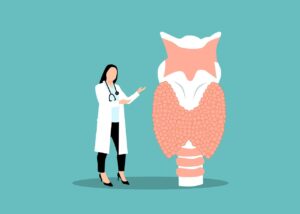PCOS: Polycystic Ovary Syndrome, as the name suggests, refers to the formation of many cysts in the ovaries along with imbalances in sex hormone levels, irregularities in the menstrual cycle, and then you have problems with ovulation that is, egg release and conceiving (getting pregnant). The hormone imbalances experienced in Polycystic ovarian syndrome (PCOS) can lead to a high risk of various other health conditions called secondary complications.
When is a woman said to have PCOS? This is usually when she has two or more of the following conditions:
- Polycystic ovaries, meaning multiple cysts developed in one or both ovaries along with enlarged ovaries.
- Irregular menstrual cycles for example less than 8 menstrual a year, or no periods for four months or more, or menstrual cycles longer than 35 days or prolonged periods that may be scanty or heavy.
- Irregular ovulation or no ovulation that is ovaries are unable to release eggs every monthly cycle.
- High levels of androgens such as testosterone, androstenedione, and DHEA.
The common PCOS symptoms:
- Irregular periods or no period at all.
- Weight gain.
- Excess facial and body hair.
- Thinning of hair (alopecia) which may be female pattern baldness.
- Oily skin and acne.
- Skin condition in which there are darkened skin patches on neck, thighs, armpits or vulva.
- Infertility or difficulty in getting periods.
- Mood swings and depression.

Causative factors of polycystic ovarian syndrome:
The causes of PCOS include genetics, high body fat percentage, low grade inflammation and hormonal imbalances. Let’s get into the hormonal imbalances:
- LPS – lipopolysaccharides from leaky gut may also play a role in polycystic ovarian syndrome (PCOS). LPS interferes with the insulin receptor function, resulting in high insulin levels. The insulin receptors get blocked due to inflammation, which leads to a build-up of insulin levels in the bloodstream; this makes the ovaries produce more androgens like testosterone, which can interfere with normal follicle development. This can cause menstrual irregularity, increase facial hair and cysts in the ovaries
- Insulin Resistance: meaning high insulin levels is considered the single biggest contributor of PCOS. Even though the rest of the body cells get resistant to insulin, the pituitary gland and ovaries are still sensitive to insulin. They can be stimulated by insulin to increase testosterone production and other androgens. High insulin can also act directly on the ovaries and increase testosterone production and interfere with ovulation
- Hypothyroidism: can also trigger or worsen PCOS. Now hypothyroidism and have lots in common for example insulin resistance, high cholesterol, irregular periods, ovarian cysts and higher free testosterone. High TSH levels can cause insulin resistance which may lead to high testosterone levels. Hypothyroidism may also cause increase in the size of the ovaries, cause collagen deposits in the ovaries that interfere with ovary function and prevent ovulation.
- High Prolactin levels: High prolactin levels cause many of the same PCOS symptoms such as infertility, high androgen levels and problems with ovulation. High levels can be caused by high stress, low dopamine levels, certain medications (anti-depressants and oral contraceptives) and conditions such as pituitary tumor.
- PCOS and dysbiosis: dysbiosis in the gut can contribute to PCOS. In women with PCOS, inflammation can increase testosterone levels. These excess testosterone levels are a hallmark of PCOS.
PCOS AND FERTILITY
PCOS is common among young women of reproductive age and is one of the most common causes of female infertility. PCOS could occur as early as the teenage or late in the twenties or thirties as well.
It is caused by an imbalance in the hormones secreted by the pituitary gland which in turn affects the ovaries. In a normal menstrual cycle FSH & LH support the development and release of the egg from one of many fluid-filled follicles (sac like secretions) in each ovary.

However, what we see in PCOS is that the hypothalamus triggers a disruption in the natural rhythm of LH & FSH production by the pituitary gland which leads to the disruption of LH & FSH, typically we see a higher level of LH and lower FSH levels leading to under developed follicles that cannot develop or release an egg. And its these undeveloped follicles turn into multiple cysts in the ovaries, which leads to infertility.
The imbalance in LH & FSH levels further leads to
- Sex hormones imbalance with higher estrogen levels (estradiol and estrone and low to very low progesterone levels.
- Excess male hormone production such as testosterone, DHEA and androstenedione which can increase estrogen production.
- This leads to problems in ovulation, irregular menstrual cycles and scant bleeding.
Managing Polycystic ovarian syndrome with Nutritional and lifestyle management.
- Focus on the gut health to reduce inflammation.
- Eat whole grains and legumes.
- Eat high fiber fruits and veggies.
- Crowd out gluten, dairy, soy, packaged foods and sugar.
- Avoid snacking at bedtime, it actually helps to liver detox as well in turn helping to balance hormone.
- Can experiment to fast from dinner to breakfast.
- Hydrate well throughout the day.
- Practice stress reduction techniques like yoga, meditation, tai chi.
- Keep a gratitude journal.
- Practice positivity.
- Laugh more.
- Do fun activities like dancing or learn a sport.
- Practice “me” time.
- Maintain a routine (sleep time & wake up time).
- Stop caffeine by 12 noon or latest 2 pm.
- Choose day time to exercise rather than night.
- Avoid any electronics one hour before bedtime.
- Take a warm shower.
- Dim lights.
- Maintain a gratitude journal.
- Practice meditation.
Ready to balance your hormones and improve your well-being? Click here for custom nutritional advice from Karishmma Chawla and start managing PCOS effectively.
Also, learn more about the difference between PCOD and PCOS here.
WE ALL DESERVE HAPPY AND HEALTHY PERIODS!





